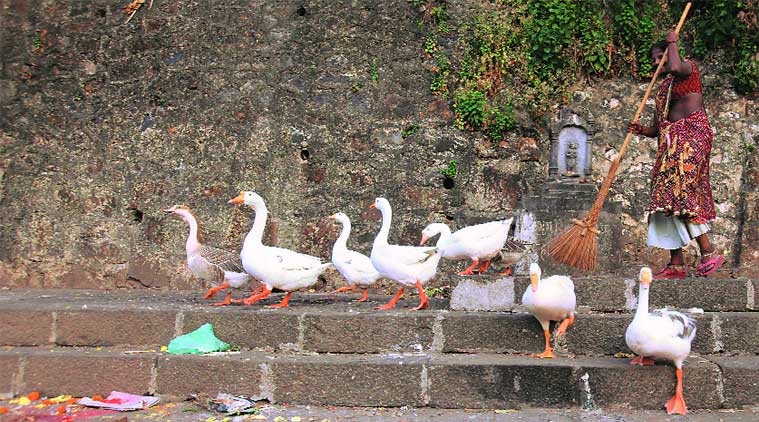- India
- International
BMC asks MPCB to inspect Banganga to check fish mortality
To avoid pollution, the BMC had created two artificial ponds at the mouth of the tank earlier this year.
 Workers clean the Banganga pond at Walkeshwar. (Source: Express photo by Pradeep Kocharekar)
Workers clean the Banganga pond at Walkeshwar. (Source: Express photo by Pradeep Kocharekar)
The civic body has finally woken up to the number of dangers the fish and the ducks are facing due to the floating flowers and polluted water at the Banganga pond in Walkeshwar.
Officials from the D-ward have written to the Maharashtra Pollution Control Board (MPCB), asking them to inspect the pond and take necessary action as soon as possible.
Several hundred fish were found floating dead last month after the pitru paksha rituals at the pond, which is an annual affair according to the trust that owns and maintains the pond.
“Fish dying at Banganga is a common thing. This happens every year after the Pitru Paksha rituals,” said Praveen Kanvinde, president of the Gaud Saraswat Brahman Temple Trust.
He further said, “Banganga is treated as the Kashi of Mumbai and people perform their last rites along the banks, and particularly on Pitru Paksh, people offer flowers, flour and rice and put them in the water. Their sentiments run high and we cannot stop them from leaving their rice and puja items in the water. The water gets polluted and the fish die.” To avoid pollution, the Brihanmumbai Municipal Corporation (BMC) had created two artificial ponds at the mouth of the tank this year. Devotees were instructed to offer flowers and other things associated with the ritual, but it made little difference as hundreds of fish still died.

The civic body, in its letter to MPCB, however, has mentioned the lowering of water levels in the tank as a potential cause of fish deaths, making no reference to the floating flowers and flour balls that the ducks and the fish consume. But BMC has another explanation for the water pollution.
According to the solid waste management officials of the ward, waste water from houses adjoining the tank seep into the pond.
“The sewer lines from the neighbouring houses are illegally connected to the tank. We had tried to plug the seepage points, but the seepage recurs. We keep cleaning and taking away waste from the tank, but unless the waste water is not stopped, there is little we can do. Moreover, the tank is a private property, so we cannot interfere much,”said an official.
anjali.lukose@expressindia.com
Apr 23: Latest News
- 01
- 02
- 03
- 04
- 05






































